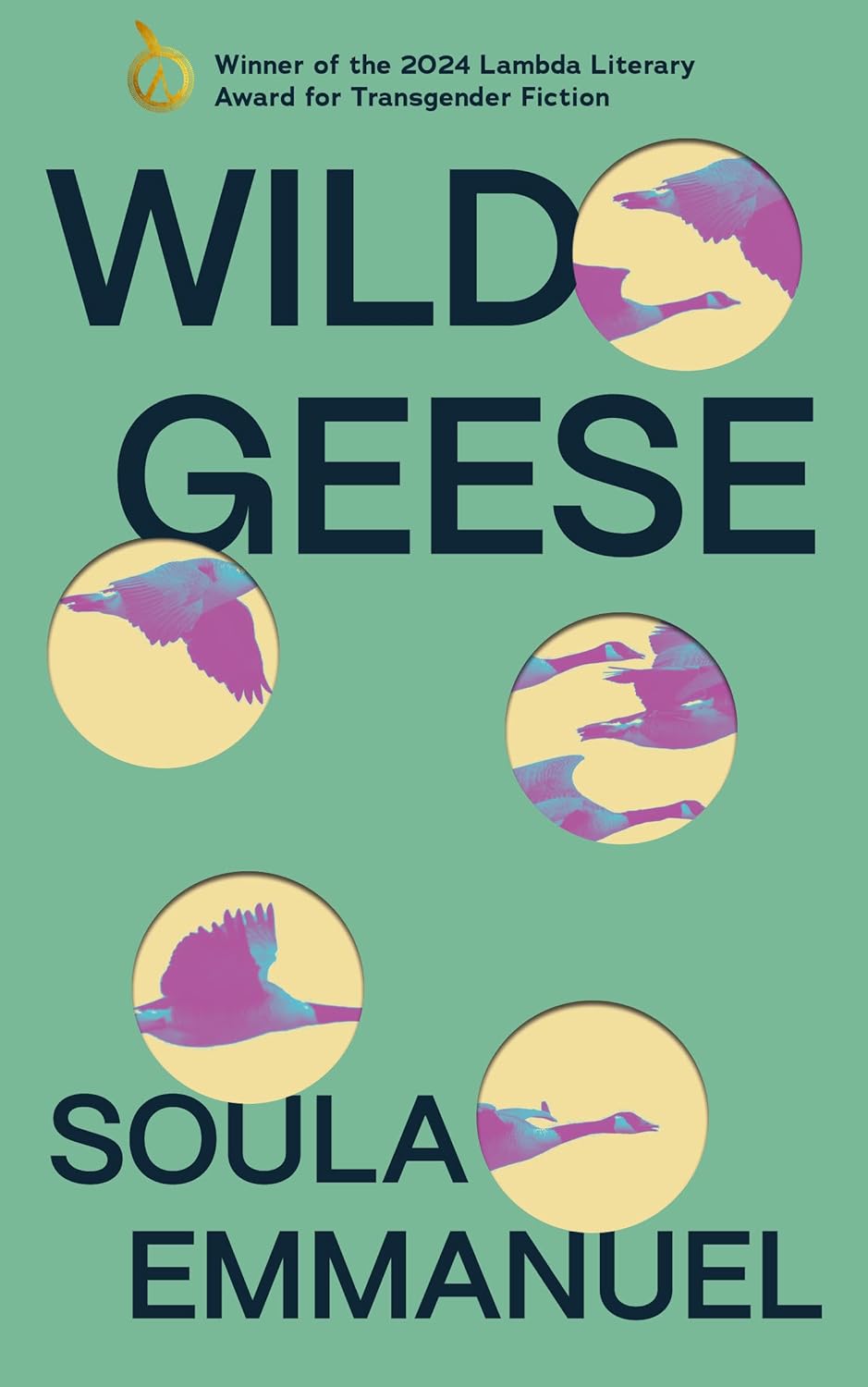Review of Wild Geese by Soula Emmanuel

Wild Geese
Soula Emmanuel
The Feminist Press, 2023, 240 pages
$17.95
Reviewed by Courtney Heidorn
There is a reason why seeing geese fly alone is rare—geese are community-oriented creatures. In Wild Geese, Soula Emmanuel employs a goose motif that mirrors the protagonist, Phoebe, and her evolution from solitude to being in community with herself and the world. The 2023 novel won several awards, including the 2024 Lambda Literary Award for Transgender Fiction. It is no surprise Emmanuel’s debut novel gained such accolades: Wild Geese grapples with the deep human longing for connection and explores how one can evade loneliness in such a diverse, globalized world.
Wild Geese opens with a solitary Phoebe, living in her professor’s sublet apartment in Copenhagen, where her only friend is a stinky ten-year-old bichon frisé. As voice-driven as Wild Geese is, Phoebe’s voice has failed to penetrate where it matters: with others. Phoebe’s life is simple and lonely; she admits, “And that is what I need: to be seen but not remembered” (9). Phoebe feels at home in her post-transition body and mind but not necessarily in the world. Emmanuel’s engaging first-person prose gives readers an image of a currently stagnant protagonist, but one who is ripe for growth. It is exciting to watch Phoebe be forced to make herself known to others and join the V-formation of the world.
Emmanuel’s decision to make Wild Geese a novel surrounding homesickness is intentional: Phoebe is not only a stranger to others but also a stranger to her setting. Phoebe’s home is in Ireland, but she geographically relegates herself to a reality of distance and disconnection. Instead of migrating for self-discovery, Phoebe is stuck in the lonely loop of escapism. Everything changes, however, when Phoebe’s ex from before her transition, Grace, spontaneously shows up on her doorstep. Fiery and spontaneous, Grace’s character is the perfect foil to Phoebe’s cool and reticent exterior. Phoebe must deal with the past now.
A nod to the novel’s title, Grace and Phoebe witness a flock of geese fly over them, “impertinent and uncaring. The sound of their squalls is distorted by distance, so it resembles the corrugated wheeze of an old alarm clock. . . Grace looks skyward. . . she seems to cast not merely her gaze but her entire being towards the birds. ‘Look at them go,’ she says. ‘So free’ ” (51). Geese migrate seasonally, but only to places that fit their needs. Phoebe is unable to experience this intentional migration due to her solitary life, but Grace changes things. She awakens a part of Phoebe that she buried in the past: the feeling of being truly known. Phoebe admits, “I know her, and she knows me. I am known” (227).
Wild Geese is a feminist novel. It is not forthright about politics or misogyny—the book is far from didactic. But Emmanuel’s prose is clear about one thing: being a woman is to be in community. It celebrates women who pull each other out of a solitary hole. Wild Geese holds women as beings with multitudes: to be a woman is to be ‘several,’ to be held ‘severally,’ and to “focus on the small things of life, to view each day as a site of exploit, as beginning and end and everything else” (229).
Courtney Heidorn (she/they) holds a BA in English and Creative Writing and is an Assistant Editor at Chestnut Review. You can see more of their work in their chapbook, Palimpsest, from Bottlecap Press and at CURIOUS Magazine and Pearl Press.
"Empowerment comes from ideas."
― Charlene Carruthers
"Your silence will not protect you."
— Tourmaline
"Gender is the poetry each of us makes out of the language we are taught."
— Leila Raven


